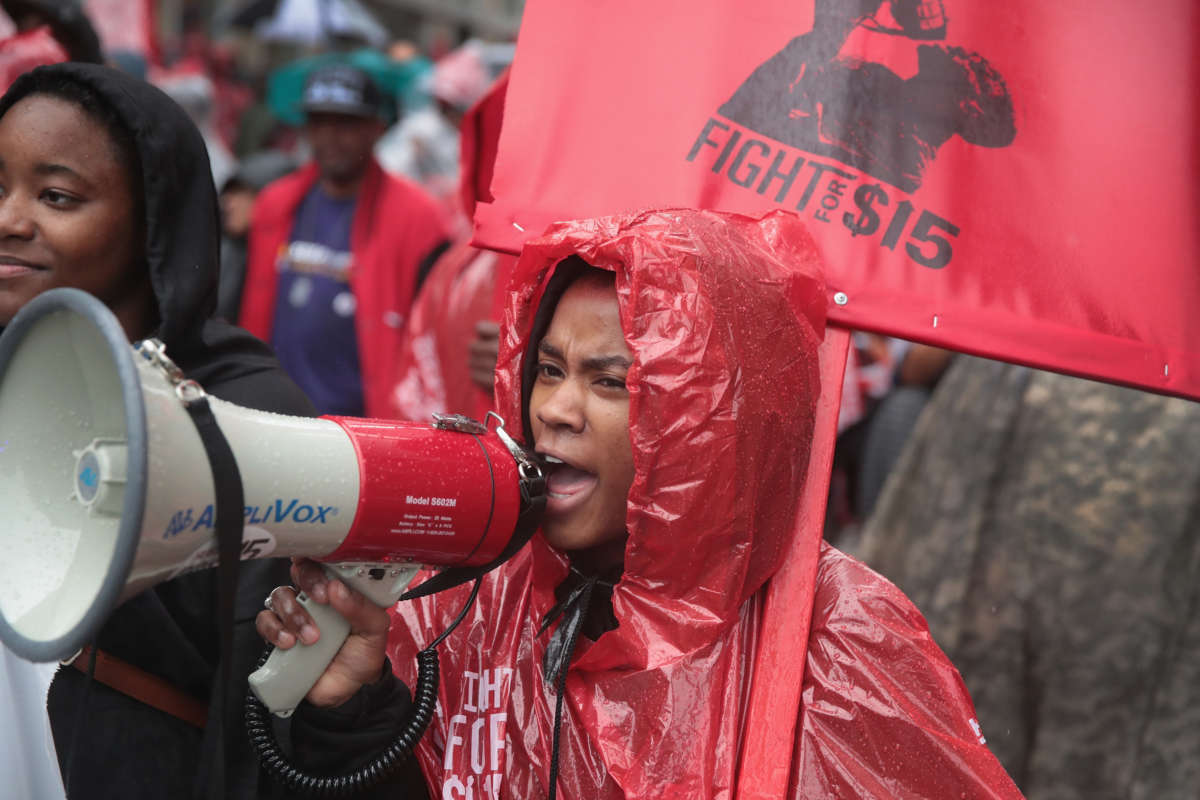Support justice-driven, accurate and transparent news — make a quick donation to Truthout today!
More than 20 states across the U.S. increased their minimum wages on the first day of 2022, raises that called additional attention to the fact that the federal wage floor remains at $7.25 an hour — where it has been stuck for more than a decade.
In an analysis published Thursday, David Cooper, Krista Faries, and Sebastian Martinez Hickey of the Economic Policy Institute (EPI) observed that the January 1 wage hikes in 21 states “range from a $0.22 inflation adjustment in Michigan to a $1.50 per hour raise in Virginia, the equivalent of an annual increase ranging from $458 to $3,120 for a full-time, full-year minimum wage worker.”
“The January 1 increases in 11 states — California, Delaware, Illinois, Maryland, Massachusetts, Michigan, New Jersey, New Mexico, Rhode Island, Vermont, and Virginia — are the result of legislation passed by state lawmakers to raise their state’s wage floors,” the EPI experts wrote. “In nine states, the changes are the result of automatic annual inflation adjustments.”
Other states are slated to raise their wages later in the new year. According to the National Employment Law Project, a record 81 U.S. jurisdictions will increase their minimum wages in 2022, and voters in several states could have the chance to vote on wage-related ballot initiatives during the midterms — a testament to the growing momentum of the worker-led Fight for $15 movement.
In California, a proposed ballot measure led by Los Angeles investor and activist Joe Sanberg seeks to gradually raise the state minimum wage to $18 an hour beginning in 2023.
Additionally, under an executive order that President Joe Biden signed back in April, the minimum wage for federal contract workers will rise to $15 an hour by January 30, 2022.
13 years — Everything has gone up in price…
…But your pay has stayed the same.
That’s life for minimum wage workers because the federal minimum wage has been stuck at $7.25 for 13 years.
If it has increased at the rate of productivity since 1960, it would be over $24 now.
— Joe Sanberg (@JosephNSanberg) January 6, 2022
While data-collecting challenges stemming from the pandemic have made it difficult to estimate how many workers will benefit from the raises that took effect on January 1, the EPI researchers stressed in their new analysis that “minimum wage increases are as crucial as ever in the current context — to protect low-wage workers from exploitation and continue toward the goal of a living wage for all workers.”
“From a macroeconomic perspective, it’s smart policy,” they added. “Low-wage households — who disproportionately benefit from increases to the minimum wage — are highly likely to quickly spend the extra dollars they receive, bolstering consumer demand as the economy continues to recover.”
But despite the fresh wage hikes, the EPI experts emphasized that 20 states — half of which are in the South — still adhere to the federal minimum of $7.25 an hour, spotlighting the need for action at the federal level.
“As economic research continues to show that higher minimum wages work precisely as they’re intended — lifting pay for low-wage workers with little, if any, impact on their job prospects — there is no excuse for lawmakers to let the federal minimum wage continue to languish,” they argued.

Early last year, House Democrats passed a coronavirus relief package that included a $15 federal minimum wage provision, but Senate Democratic leaders later removed the measure to conform to the advice of the upper chamber’s unelected parliamentarian.
Eight Senate Democrats then proceeded to join Republicans in voting down Sen. Bernie Sanders’ (I-Vt.) attempt to overrule the parliamentarian and reinclude the provision.
In a tweet on Thursday, Sanders lamented that “the average worker, when adjusting for inflation, is making $44 a week LESS today than they made in the 1970s.”
The recent, record-breaking surge in inflation — which has been caused by a number of factors, including pandemic-related supply chain disruptions and corporate profiteering — has eroded the modest wage growth that workers have seen over the past year, leading many employees to seek out higher pay and better benefits using the leverage conferred by a tight labor market.
The EPI’s Cooper, Faries, and Hickey wrote Thursday that “with consumer prices rising substantially over the past year, the need for a higher federal minimum wage is more acute than ever — and the longer Congress waits to enact an increase, the larger that increase will need to be to establish an adequate wage floor.”
“The Raise the Wage Act of 2021 — a bill that would raise the federal minimum wage to $15 by 2025 — would finally set the country’s minimum wage on the path to a livable wage,” they argued, “achieving a policy goal that economic and racial justice advocates have been demanding for over 50 years.”
Press freedom is under attack
As Trump cracks down on political speech, independent media is increasingly necessary.
Truthout produces reporting you won’t see in the mainstream: journalism from the frontlines of global conflict, interviews with grassroots movement leaders, high-quality legal analysis and more.
Our work is possible thanks to reader support. Help Truthout catalyze change and social justice — make a tax-deductible monthly or one-time donation today.
